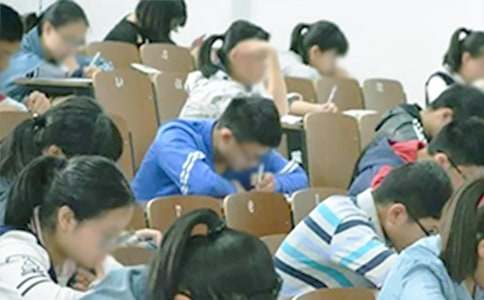2017年12月英語四級考試仔細(xì)閱讀專練
Happiness can be described as a positive mood and a pleasant state of mind. According to recent polls (民意測驗(yàn)) sixty to seventy percent of Americans consider themselves to be moderately happy and one in twenty persons feels very unhappy. Psychologists have been studying the factors that contribute to happiness. It is not predictable nor is a person in an apparently ideal situation necessarily happy. The ideal situation may have little to do with his actual feelings.

A good education and income are usually considered necessary for happiness. Though both may contribute, they are only chief factors if the person is seriously undereducated or actually suffering from lack of physical needs.
The rich are not likely to be happier than the middle-income group or even those with very low incomes. People with college educations are somewhat happier than those who did not graduate from high school, and it is believed that this is mainly because they have more opportunity to control their lives. Yet people with a high income and a college education may be less happy than those with the same income and no college education.
Poor health does not rule out happiness except for the severely disabled or those in pain. Learning to cope with a health problem can contribute to happiness. Those with a good sex life are happier in general, but those who have a loving, affectionate relationship are happier than those who rely on sex alone. Love has a higher correlation with happiness than any other factor.
It should be noted that people quickly get used to what they have, and they are happiest when they feel they are increasing their level no matter where it stands at a given time.
Children whose parents were happily married have happier childhoods are not necessarily happier adults.
The best formula for happiness is to be able to develop the ability to tolerate frustration, to have a personal involvement and commitment, and to develop self-confidence and self-esteem.
1. It can be inferred from the passage that______.
A. happiness is predictable
B. a person in an apparently ideal situation must be happy
C. the rich are likely to be happier than the middle-income group
D. happiness is not necessarily connected to one's situation in society
2. People with college education______.
A. are not happier than those who have only an education at high school
B. are much happier than those who did not graduate from high school
C. have less opportunity to control their lives
D. have more opportunity to control their lives
3. According to the article, happiness is greatly dependent upon______.
A. a happy childhood
B. great wealth
C. a feeling that conditions are becoming for the better
D. a college degree
4. Which of the following is most likely to contribute to happiness? A. Being exceptionally good-looking.
B. Having a loving, affectionate relationship.
C. Having a good paying job.
D. Meeting lots of people.
5. Which of the following attitudes or feelings is most likely to be found in happy people?
A. Having self-esteem.
B. Being sure of keeping everything they already have.
C. Never being jealous.
D. Knowing how to be charming.
答案:1. D 2. D 3. C 4. B 5. A
【2017年12月英語四級考試仔細(xì)閱讀專練】相關(guān)文章:
大學(xué)英語四級考試仔細(xì)閱讀練習(xí)題04-17
大學(xué)英語四級仔細(xì)閱讀練習(xí)題04-18
如何攻克英語四級仔細(xì)閱讀和翻譯?03-02
英語專四考試高頻短語03-02
英語專四考試技巧作文06-01
專四考試必備英語短語精選03-02
英語專四考試必備短語參考03-02
專四考試必備英語短語合集03-02
英語四級翻譯每日一練:風(fēng)箏04-05
英語四級翻譯每日一練:魯迅02-28
